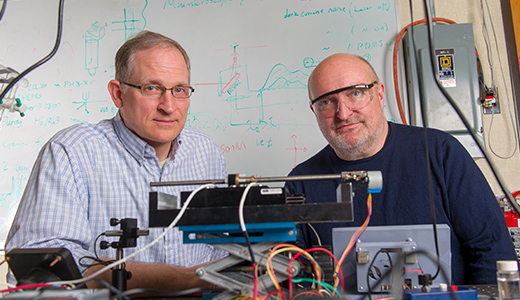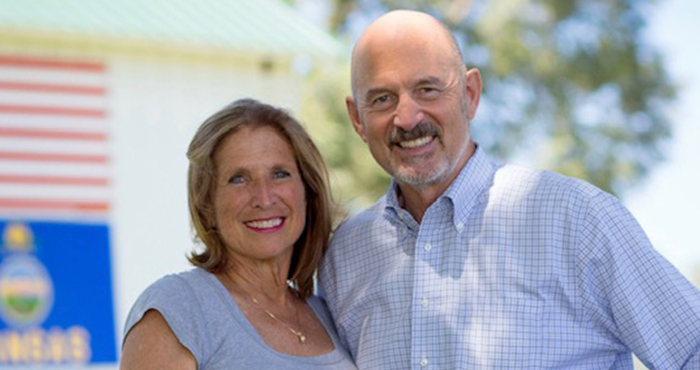K-State scientists develop device that detects diseases at their earliest stages
Imagine going to your doctor’s office for your annual checkup, where a simple and affordable blood test tells you in less than an hour if you have a type of cancer or a neurodegenerative disease. Dr. Stefan Bossmann and Dr. Chris Culbertson, both Kansas State University professors and researchers, have developed a device that does just that.
The prototype of their device, made possible through a $50,000 gift from a donor, can detect many different types of cancers and diseases such as ALS, Alzheimer’s and Parkinson’s, at stage 0 or 1 — often before symptoms occur.
“At stages 0 or 1, we could cure about half of the patients with the technology we currently have at minimal cost compared to what we spend unsuccessfully if we detect cancer too late,” Bossmann said. “So detecting disease at these early stages is potentially a big game changer.”
Their device can save lives and decrease the cost of treatment.
“What I love to do is figure out how we can decrease the amount of money we need to spend on diagnosing and treating disease,” Culbertson said. “With this device, we could diagnose diseases in their earliest stages where patient prognosis would be better and it would be much cheaper to treat the patient. And, most importantly, they would have better outcomes.”
The initial investment of $50,000 from a donor to fund their prototype device led Bossmann and Culbertson to be awarded a total of $ 1,189,225 from the National Science Foundation.
“We are grateful for the gift of seed money, because without that investment, we couldn’t prove the feasibility of our technology,” Bossmann said. “Without this proof, we couldn’t convince larger grant agencies, such as the National Science Foundation or the National Institutes of Health, to support our research with substantially larger funds.”
Bossmann likens the device to a barcode scanner that can detect when enzymes are slightly out of their normal range, indicating the early stage of disease. The device and the research behind it can be used for a variety of purposes, but Bossmann and Culbertson have narrowed their focus in order to be more successful getting grant funding.
“We’ve decided to focus on areas that are most important to agencies like the National Institutes of Health, so diseases that have a large impact on our population, such as pancreatic cancer,” Culbertson explained. “If you don’t detect pancreatic cancer early, patient prognosis is really poor once the patient becomes symptomatic. Treatment is often unsuccessful and costly.”
K-State’s success in basic cancer research has led the university to establish the Center of Excellence in Pancreatic Cancer Research in November 2018, led by Bossmann. A multidisciplinary team of outstanding researchers from five K-State departments and several specialized laboratories, as well as the University of Kansas Cancer Center, will tackle this deadly disease, focusing on early detection and new, more effective drug treatments.
Private support for this research, and all research at K-State, is vital to the success of faculty and students.
“Philanthropic support for basic science research is critically important because over the last several decades, funding from national agencies has not kept up with the need,” Culbertson said.
Philanthropy also provides students opportunities to do hands-on research with renowned scientists like Culbertson and Bossmann. The Johnson Cancer Research Center awards scholarships to outstanding undergraduate and graduate students to learn basic research techniques. Between them, Bossmann and Culbertson are mentoring 22 undergraduate and 13 graduate students.
“We come up with the ideas, but the students do a lot of the work,” Culbertson said. “The students solve the nitty-gritty problems.”
Bossmann agreed, stating, “Without high-quality students, we couldn’t do what we do.”
Investment in preliminary, basic research and in students who are learning from the best lays a solid base for the future of disease research, ultimately leading to cures for many of the worst diseases.
“Cancer research is a team sport,” Bossmann said. “It’s not done by one great researcher who has one great idea that will solve the problem. It’s done in millions of small steps. When you have the chance to do this for your career, you can go thousands of steps, and if you have the right partners, you can get ahead so much better.”
Early-detection device
- Size of a shoe box
- Gets results in about 30 minutes
- Test costs a couple hundred dollars
- Detects enzyme levels in the blood
- Bossmann, Culbertson and K-State have a patent
- Research and detection applications
Diseases it detects
- Pancreatic cancer
- Breast cancer
- Non-small cell lung cancer
- Cervical cancer
- Ovarian cancer
- Gallbladder cancer
- Hepatoma (Liver cancer)
- Colorectal cancer
- Alzheimer’s disease
- ALS
- Parkinson’s disease
- COPD
- Pain markers, lessening the chance of opioid addiction







